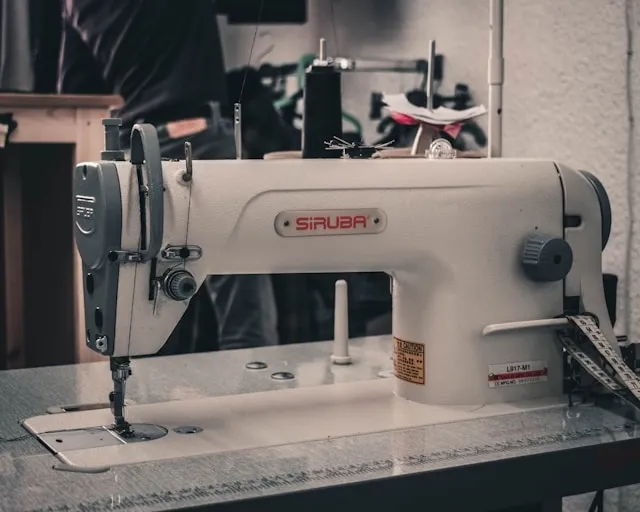Sewing Patches on Leather: Best Ways To Sew Patches On Leather By Hand Or Machine
In this blog post, we delve into the nuances of sewing patches on leather. Discover insights into the best techniques for both hand and machine sewing. Whether you’re customizing a vest, bag, or other leather goods, take in these expert tips and solutions for achieving professional-looking results that are built to last.

Key Takeaways
- You can sew patches onto leather by hand or with a sewing machine.
- There is a specific process for each method, and you should ensure you have a heavy duty needle and durable thread.
- The best stitches to use are a saddle stitch for hand sewing or a triple stitch for machine sewing.
- We supply high-quality custom patches in a range of materials optimized for sewing onto a range of fabrics, including leather.
Table of contents
-
How To Sew Patches On Leather: Step By Step
-
Techniques And Tips To Sewing Patches On A Leather Vest
-
Best Way To Sew Patches On Leather
-
What Is The Best Thread For Sewing Patches On Leather?
-
Can You Sew Patches On Leather With A Regular Sewing Machine?
-
What Is The Strongest Stitch For Patches On Leather?
-
Is It Better To Sew Patches By Hand Or Machine?
-
Alternative Patch Attaching Methods
How To Sew Patches On Leather: Step By Step
Before you begin sewing custom motorcycle patches - or any other patch types - on leather, you need to ensure you have the right needle and thread. A heavy-duty needle designed for leather is crucial, and strong, thick thread will complement the weight and color of the leather.
Here is the four-step process for stitching patches on leather.

Prepare The Leather
Clean the section of leather where the patch will attach. You can use a damp cloth to gently remove any dirt and residue, leaving the surface clean and optimized for sewing. Once this is done, take a chalk or fabric marker and mark the intended placement location.
Secure The Patch
Position the patch onto the area of the leather you have marked out for placement. Make sure it is properly aligned and oriented, then use clips or pins to firmly secure the patch in place and prevent it from shifting during sewing. Check that it sits flat on the leather and prepare to begin the sewing process.
Sew The Patch
Thread your sewing machine with the chosen thread, or prepare your needle if you plan to sew it by hand. You should sew around the edges of the patch, choosing a straight stitch or zigzag stitch for optimal aesthetics and durability. Take your time to sew evenly and achieve maximum tension as you sew.
Finish The Edges
Once you have sewed around the patch perimeter and it is securely attached, trim away any excess thread and inspect the stitches for consistency. If necessary, you can reinforce the stitches by sewing over them again, or you could apply a small amount of clear fabric glue to seal the edges. Once this is done, you will have a perfectly attached patch on your leather piece.
Techniques And Tips To Sewing Patches On A Leather Vest
When you sew patches onto a leather vest, you can personalize and customize your style, Or, if the vest relates to your motorcycle club membership, you should follow motorcycle vest patch placement traditions to get the right look for your MC. Vests are a canvas for self-expression, and patches often represent affiliations, interests, and achievements.
Various types of patches can be used to sew onto a leather vest. Popular choices include:
- Embroidered patches: These feature intricate designs stitched onto fabric backings.
- Printed patches: Adorned with vibrant, detailed graphics transferred onto fabric.
When you sew patches onto a leather vest, the right needle and thread for leatherwork are essential. You must also consider the placement and arrangement of your patches to achieve a balanced look and/or adhere to traditions and rules.
Create custom motorcycle patches for your leather vest
Custom motorcycle patches are a common choice for leather vests, and we can create them to your specifications and deliver a high-quality, personalized addition to your vest.
Best Way To Sew Patches On Leather
The best way to sew patches on a leather vest or other leather item depends on you. Both hand sewing and machine sewing have distinct advantages:
- Hand sewing: This offers control and precision with your stitching, but it can be time-consuming.
- Machine sewing: This is faster and more efficient, but may require careful attention to avoid damaging the leather.
Whichever method you choose, be sure to position the patch accurately before you sew. You can mark the placement and use clips or pins to hold the patch in place while you sew along the edges for a professional finish.
What Is The Best Thread For Sewing Patches On Leather?
People often make comparisons between woven vs embroidered patches, and other patch types, for sewing onto leather. But what really matters is the best thread that offers the durability and strength to work on leather. Nylon and polyester threads are popular choices as they offer a high tensile strength and resistance to abrasion.
When you sew patches on leather, the tools you choose are extremely important. Here are some essentials:
- Heavy-duty needles designed for leatherwork that won’t break.
- Clips and pins to hold the patch in place before you sew.
- If you are hand-sewing, a thimble will protect your fingers as you work with the strong, sharp needle.
With the right combination of tools and materials for leatherwork, you can achieve professional-quality results.

What Kind Of Thread Do You Use For Sewing Patches On Leather?
When sewing a patch on leather, using the right thread is crucial for durability and longevity. As mentioned, threads like nylon and polyester are generally preferred for their overall strength and resistance to abrasion - important features when working with tough, dense materials like leather.
The reason we choose these threads is because their tensile strength is less vulnerable to breakage, so the stitches will hold better over time. Additionally, there are many colors available for nylon and polyester threads, facilitating a seamless integration with the leather’s color.
With the appropriate thread to hand, you can confidently sew patches on leather with the knowledge that they will withstand wear and keep looking their best for years to come.
How Do Beginners Sew Leather Patches With A Machine
When it comes to how to sew patches on leather with a machine, beginners may need a few tips. Start by ensuring you have a heavy-duty needle suitable for leatherwork and adjust the machine's tension and stitch length setting to accommodate the thickness of the leather.
Here are a few tips for the sewing itself:
- Practice on some scrap leather first to ensure optimal tension and stitch quality before you begin.
- Go slowly and carefully, guiding the leather and patch through the machine to avoid shifting or bunching.
- Consider using specialty threads designs for leather applications for secure stitching.
With our service, you get high-quality custom vest patches and other patch types optimized for sewing by machine or by hand.
Need high-quality patches made specifically for vests?
With our custom vest patches, you can create products from various materials that will complement your leather vest perfectly and match your desired placement with some simple stitching.
Design yoursCan You Sew Patches On Leather With A Regular Sewing Machine?
It is possible to sew patches onto leather with a regular sewing machine, but you will need to ensure that your machine is capable of handling thicker materials. A heavy-duty sewing machine is ideal, as it will have a strong motor and adjustable foot pressure facility to accommodate the density of leather.
You should also install a heavy-duty needle designed for leatherwork, and adjust the machine’s tension settings to prevent skipped stitches or broken thread. Proper setup of your sewing machine is key to achieving professional-quality results when sewing patches onto leather.
If you feel uncertain about this, you could explore how to attach patches without sewing. But using a machine offers convenience and efficiency, enabling you to customize your leather items with ease.
What Is The Strongest Stitch For Patches On Leather?
The strongest stitch for sewing patches on leather is the saddle stitch. This is a hand sewing technique, wherein you use two needles and a single thread to create a robust, even stitch pattern that resists wear and tear very effectively. Essentially, you pass each needle through the same hole from opposite sides, meaning every stitch is backed up in the event of one thread breaking.
If you are machine sewing, your most robust options are the triple stitch or reinforced stitch. With these, your machine will sew each stitch three times, creating a highly durable seam. You can choose which of these methods you use, but all will provide a secure, durable attachment if done correctly, as well as a polished appearance.
Reinforcing Sewn-On Patches Without Visible Stitching
When you are working with thinner leather or a faux alternative, reinforcing your sewn-on patch can help maintain durability without adding visible bulk. One effective method is to use lightweight fusible interfacing on the reverse side of the leather, directly behind the patch.
This is helpful as it secures the thread lines and reduces the risk of tearing over time. Make sure you use a low heat setting and a pressing cloth when fusing to minimize the risk of damage to the leather’s finish.
This is an approach that is particularly useful for vintage items or soft-grain leather that might be prone to stretching or fraying.
Design your own custom leather patches
Leather complements leather well, and our high-quality custom leather patches are available in various designs and colors to match your leather vest, with sew-on and other options available.
Is It Better To Sew Patches By Hand Or Machine?
The choice between sewing patches onto leather by hand or by machine depends on your skill level and the specifics of your project. It can be challenging to sew onto leather with a regular sewing machine, but it is achievable with the right setup. You will need:
- A heavy-duty needle.
- Suitable thread.
- Adjustments to the machine’s tension.
If you choose this method, you will get consistent, even stitches, and the job will be done a lot quicker.
Sewing by hand, meanwhile, gives you greater control and it is gentler on the leather fabric. You can use techniques like the saddle stitch to get a strong, durable finish. Sewing by hand is more time-consuming and it requires a different skillset, but it ensures a secure and professional finish if done well.
Can You Hand Sew Patches On Leather And Vests?
Hand sewing patches on leather and vests is not only possible, but it offers several advantages, particularly if you need more intricate detailing. To hand-sew patches onto leather, you must use a heavy-duty needle and a strong thread like nylon or polyester. And you must use an appropriate stitch technique, like a zigzag stitch or a saddle stitch for extra durability.
Begin by positioning the patch on the vest and securing in place with clips, pins, or a temporary adhesive. Create holes along the edges of the patch with an awl if you want to ease the process of pushing the needle through. With hand sewing, you get precise control, so you can achieve a strong attachment without damaging the leather, so it is great for customizing vests..
Other Patch Sewing Tips
When learning how to sew patches onto leather, consider these additional tips:
- Use double-sided tape: This is great for temporarily holding a patch in place for sewing.
- Test on scrap leather: Practice your stitches on some scrap leather to ensure you are ready.
- Wax your thread: Coating the thread in beeswax can help reduce friction and prevent tangling.
- Keep stitches consistent: A ruler or stitch guide will help keep your stitches evenly spaced.
- Backstitch for extra security: Begin and end your sewing with some backstitches to secure the thread.
- Leather conditioner: Keep the leather supple after sewing by applying a leather conditioner.
- Rotary cutter: A rotary cutter makes the trimming of extra patch fabric before sewing more precise.
- Curved needles: Curved needles help you maneuver more easily in difficult-to-reach areas.
What Size Needle Is Needed To Sew A Patch?
The needle size for sewing patches on leather depends on the thickness of the leather and the patch type. Here’s a brief guide:
- Light-medium weight leather: Use a size 90/14 or 100/16 leather needle - perfect for fabric or custom embroidered patches.
- Thicker leather: Opt for a size 110/18 or 120/19 needle to ensure it can penetrate the material without breaking.
For delicate or more intricate patches, consider working with a smaller needle to avoid leaving visible holes. It must be strong enough to work with leather, however, so this is a delicate balance.
What Is The Best Sewing Technique For Patches?
As it is the strongest, the saddle stitch is probably the best technique for sewing patches on leather. Known for its durability and professional look, this hand-sewing method creates an interlocking stitch pattern by sewing with two needles and one thread.
For machine sewing, the triple stitch is the way to go. Your machine will sew each stitch three times for significantly enhanced strength and durability. Both of these techniques are great for achieving a secure and polished finish when stitching patches on leather.

Alternative Patch Attaching Methods
When considering non-sewing methods for attaching patches to leather, here are the three most popular options:
- Iron-on patches: Learn how to iron on patches to activate the adhesive backing, but be cautious about leather’s sensitivity to heat.
- Glue: Leather or fabric adhesive can be used to achieve a strong bond without sewing.
- Velcro: This versatile option involves attaching one side of the Velcro onto the leather with a peel-and-stick mechanism or fabric glue, then attaching the patch to it for a removable option.
Consider what will work best for your needs when considering how to attach patches to your leather garments.
Create the perfect patch type to add to your leather vest
Our custom embroidered patches offer intricate and textures designs with outstanding durability. They are excellent for sewing onto leather vests for an elegant and long-lasting embellishment.
Create hereFrequently Asked Questions About Sewing Patches On Leather
How Do You Sew Patches On Leather?
You can sew patches onto leather by hand, using a saddle stitch, or with a machine. You will need a heavy-duty needle and strong thread for either technique, and take special precautions to protect the leather.
What Is The Best Way To Sew Patches On A Leather Vest?
For hand sewing, you should use a saddle stitch for a durable, professional finish. With machine sewing, the triple stitch is best, as it will offer the most secure attachment for your patches.